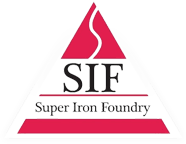
₹ 129600
₹108- ₹108
1200
₹108
0.00

13 Mar 2025
18 Mar 2025
19 Mar 2025
Application Details
Super Iron Foundry IPO is a fixed price issue of ₹68.05 crores, consisting entirely of a fresh issue of 63.01 lakh shares at ₹108 per share. The IPO opened for subscription on March 11, 2025, and will close on March 13, 2025, with allotment expected on March 17, 2025. The IPO is set to list on BSE SME on March 19, 2025.
Investors can apply for a minimum lot size of 1,200 shares, requiring an investment of ₹1,29,600 for retail investors, while HNIs must apply for at least 2 lots (2,400 shares) amounting to ₹2,59,200.
About Super Iron Foundry Limited (SME IPO)
Super Iron Foundry Limited, incorporated in July 1988, manufactures a range of castings, including municipal castings, ductile iron pipe fittings, automotive castings, agricultural castings, railway castings, and cast-iron counterweights. Its products are widely used in major construction projects for stormwater, sewerage, telecommunications, and utility networks.
The company exports globally, adhering to international standards like EN124, with key markets in Europe and the Middle East. It has contributed to prestigious Middle East projects such as the New Hamad Port, Turkish Air Base, and Lusail FIFA Stadium. The company's state-of-the-art robotic production facility in Durgapur, West Bengal, spans 20 acres and holds ISO 9001:2015 and ISO 14001:2018 certifications, ensuring quality, sustainability, and compliance with safety and environmental standards.
FAQ
IPO stands for "Initial Public Offering." It's the process through which a privately-held company becomes publicly traded by offering its shares to the general public and listing them on a stock exchange for trading. This allows the company to raise capital from investors and grants individuals and institutions the opportunity to invest in and own a portion of the company.
The life cycle of an IPO, or Initial Public Offering, begins with a company's decision to go public. It involves hiring underwriters, registering with regulatory authorities, determining the IPO price, marketing to investors, and the subscription period where investors place orders for shares. After allocation and listing, shares become publicly tradable, and the company enters the secondary market. Ongoing reporting and corporate governance are crucial as the company continues to operate as a publicly-traded entity. The IPO aims to raise capital for growth and provides investors with opportunities to trade shares in the company.
An IPO (Initial Public Offering) is when a private company goes public by selling shares to the public. Investors buy these shares, giving them ownership in the company. It's a way for companies to raise capital and expand. The process involves underwriters, regulatory filings, setting the IPO price, and marketing to investors. After the IPO, shares can be traded on a stock exchange. IPOs offer opportunities and risks, so investors should research and consider carefully.
"Upcoming IPOs" refers to initial public offerings that have been announced by private companies but have not yet occurred. These are companies that plan to go public in the near future by issuing shares to the public and listing them on a stock exchange. Investors often keep an eye on upcoming IPOs as they represent opportunities to invest in companies at their early stages of public trading, potentially capturing growth potential. These offerings are typically accompanied by significant media and investor attention as they approach their launch dates.
 Download
Download